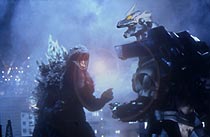 Let’s dispense with the introductions, shall we?
Let’s dispense with the introductions, shall we?
Godzilla X Mechagodzilla, following the current vogue, takes place in yet another freakish alternate reality, as distant from all previous Godzilla films as they are to us. In this wacky parallel dimension, Godzilla first appeared in 1954, “raided” Tokyo, and fell to Dr. Serazawa’s Oxygen Destroyer the very next day. The year 1999 marks his second appearance in this history, and the film’s opening sequence.
Akane Yashiro (Yumiko Shaku) is just another groundpounder in the JDSF. Oh sure, she fights monsters with a laser tank for a living, but what’s that to an intelligent, independent, young Japanese woman on the make? Besides, she’s a member of the Anti-Megalosaurus Force, an elite unit created specifically to counter the continuing threat Giant Monster pose to Japan. As such, the AMF rushes to counter Godzilla’s latest insurgency. Three guesses who the winner is. In the confusion of battle, Akane accidentally gets herself and a truck load of her superiors into a road accident. Akane survives. Her colleagues go over a cliff and under Godzilla’s foot. Akane even gets to watch because God himself knows we can’t have a strong female protagonist in a Japanese film who isn’t suffering from some kind of trauma or another (unless she’s looking for a Just the Right Man to turn her into a giggling, pre-adolescent puddle, torn screaming from the depraved psyche of a deranged, Asian-obsessed pedophile…the type of guy who keeps Oriental Women magazine in business).
As the political establishment wets itself over Godzilla’s re-appearance, Akane is re-assigned in the wake of her little…incident. We leave her in the Data Room (the JDSF equivalent of Agent Mulder’s basement office) and quickly switch to our other (male) protagonists: Tokumitsu Yuhara (Shin Takuma), who will be our Scientist for the remainder of the film, by virtue of the fact he’s designated one of “Japan’s greatest scientific minds.” So says Science Minister Hayato Igarashi (Akira Nakao). And he should know because our Science Minister has an absolutely brilliant idea: use the assembled brain power of Japan to build a “bio-robot” in the image of Godzilla…using the bones of the first Godzilla (picked clean by the Oxygen Destroyer) as a base…and a support structure. “It’ll be a powerful weapon against Godzilla,” he says. Like a politician’s never uttered those words before…
If history teaches us anything, it should teach us this: Given half the chance, leaders will always use National Crises as an excuse for massive build-ups of arms. Japan’s leaders are no different. Once again, violent solutions are the only solutions considered. After all, this is a movie, film is a visual medium, and you try to think of something as visually striking as the sight of a giant robot fighting a giant monster in the heart of a major metropolis. If you’re anything like me, you’ll have to think on that a bit. So don’t get me wrong. I understand the need for a Mechagodzilla. He (or it) is one of my favorite re-occurring Godzilla antagonists. But I have some problems with his (or its) choice of films.
For one thing, they’re exceedingly narrow-minded…almost myopic. Certainly their sense of scope is small…ironically so, considering the film nominally centers around a three hundred foot lizard. I mean, let’s pretend for a moment. You’re the President of China. You turn on CNN one day and find out Japan is building a giant frickin’ robot right next door. To “defend” themselves, they say. Yeah, right. What exactly do you do? That could be a movie in itself…and it’ll have to be, because this movie sure as hell isn’t going to address the question (or even mention it). How do you think Kim Jong Il would take the news of a Mechagodzilla next door? Or our own Glorious Leader, over here in the United States?
I mention this only because Godzilla X Mecha-Godzilla takes care to add a political element to it’s story, apart from (but interacting with…occasionally and only tangentially) all the sordid, giant-monster-soap-opera turmoil our two protagonists go through. Yet the political peanut gallery never admits anyone outside the Japanese government to their (exceptionally polite, even by parliamentary standards) shouting matches. Budget consciousness and time play a majority part in this, I know…but there’s no denying the nationalistic nearsightedness. In fact, now that I think about it, nearly every giant monster picture suffers from some form of this malady. As if the appearance of a 300-foot, fire breathing, nuclear powered dinosaur didn’t have world wide implications. Past Toho pictures at least paid lip-service to this by casting a Token Anglo or three, almost all of whom generated unintended comedy gold thanks to their unprofessional acting and dead (not “deadpan,” just “dead”) line-reading abilities.
But anyway…three years pass and the “new” Mechagodzilla (named Kiryu…for no other apparent reason than to distinguish him from his predecessors) stands ready. Following bad movie law, Akane is inexplicably drafted to join the team set to pilot Kiryu. Why else would we have invested so much time (a full five minutes at this, the twenty minute mark) in her story? Even the casual movie goer knows Akane is destined to pilot Kiryu, in the same way domestic pets know when an earthquake is about to strike. The same way I (the jaded, cynical movie reviewing snit that I am) know her relationship with Yahara (and Yahara’s perky daughter, Sara, who will be our Kenny for the remainder of the picture) will teach her some lesson or another….probably have something to do with being isolated and letting the past haunt you or some damn thing.
Sure enough, Akane and Yahara cross paths before the first major action set piece. Seems one of Akane’s team mates–a little weasel name Hayama–just happened to have a brother in that truck that wound up under Godzilla’s foot. He interrupts Yahara’s comically inept attempt to pick Akane up by playing Iceman to Akane’s Maverick. She, being all stoic and bad-ass, sets him right…and then winds up in a heart-to-heart with Yahara and Sara about…how isolated she is…zzzzzz…
Thus the fundamental flaw of modern Godzilla movies is once again slapped, broadside, across my face. No matter how remarkable (or unremarkable) their special effects, or how broad their story-scope, they remain depressingly predictable. They move from A to B to C with all the energy of a single thirty-something’s morning routine. I’m moved to feel almost cheated by this kind of rampant story-telling laziness. And once again pitch a bitch about those damned studio suits with their insistence on churning these films out, every year, as if they’re stamping parts for a Toyota factory. Even the smallest moral, ethical, social, or political implications of building a giant robot from the bones of a nuclear monster (like, say, the potential collateral damage) are left unconsidered, which is sadly ironic in the face of what develops…
Because the God of the Godzilla-verse has a wonderful sense of timing, Godzilla interrupts Kiryu’s first manned flight-test. The Big G comes ashore, trounces an unfortunate water park, roars at the descending Mechagodzilla…and then leaves his mechanical doppleganger to go mad, Evangellion-style, and ravage the cityscape. I guess the G-man’s roar meant, “Sorry, bud. Didn’t know this bit was already taken. Tell you what: go on ahead with…whatever you were doing…I’ll try the next town down the coast. Sure they’ve got some scenic landmark or another I can smash.”
At last, I think. Something new…or, at the very least, different. Tales of man constructing his own demise in moments of psychotic hubris were ancient when Mary Shelley was still a virgin. But what do you do when your Frankenstein is three hundred feet tall and armed with all manner of missiles, laser beams, and a freeze ray (or “Absolute-Zero Gun”) so large it would send Captain Cold into orgasmic paroxysms?
The humans of this particular story decide to do nothing, evacuating the populous in Kiryu’s path (typhoon style) and wait until the robot literally runs out of juice…what the hell, everybody knows the construction industry is to Japan what Big Oil is to the United States, right? What’s a few independent contracts to pass around between friends…
Pop quiz: Will our director Masaaki Tezuka (director of 2000’s Godzilla vs. Megaguirus)and screenwriter Wataru Mimura (writer of the above, along with Godzilla: 2000, Yamato Takeru and 1993’s Godzilla vs. Mecha-Godzilla) exploit the dramatic potential implicit in the above “What do you do when your Frankenstein…” query? Or will they instead chose a quick fix solution that destroys all the tension and build-up they’ve established up to this point, in favor of staging an epic, climactic daikaiju big battle in Tokyo…at night?
What are the chances of that happening, right? It’s only the common denominator of the whole fucking franchise. And nobody knows common denominators like Tezuka and Mimura. These two dingbats may be near blind to the possibility of a giant monster tale (must’ve boycotted Gamera out of patron loyalty), but by God they know how to hit all the high notes and stick to the All-Mighty Release Schedule. Godzilla, and we, his fans, are that much worse off for it, since no one at Toho seems to have courage enough to dream up an original or creative thought.
And that’s the way it is. Human acting is serviceable all around…but in the final summation, I really could care less. I know the Love of a Good Man is going to draw Akane out of her Post-Traumatic Stress Disorder-induced shell and coax her toward heteronormativity the same way I know Godzilla’s going to sink back into the sea just before the credits roll…and, like any good comic book villain, they’ll be no body to discover, no postmortem to write up, and plenty of room left for the inevitable sequel…a direct one this time. Starring Mothra. God help us all.
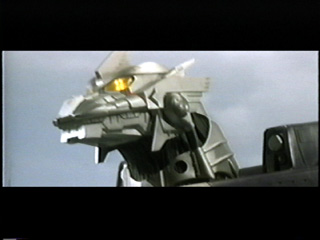 I’ll get to that eventually, but in the meantime I wonder if Toho’s setting up some sort of Crisis on Infinite Earth‘s senario with all these wacky, parallel dimensions appearing and disappearing at will? Will the battle-hardened, Kenny-laden heroes of the Godzilla Multiverse be joining forces against some giant, rubber suited version of the Anti-Monitor at some time in the Not Too Distant Future? Have I finally succumb to sleep deprivation? Or am I merely deprived of honest-to-God good Godzilla films?
I’ll get to that eventually, but in the meantime I wonder if Toho’s setting up some sort of Crisis on Infinite Earth‘s senario with all these wacky, parallel dimensions appearing and disappearing at will? Will the battle-hardened, Kenny-laden heroes of the Godzilla Multiverse be joining forces against some giant, rubber suited version of the Anti-Monitor at some time in the Not Too Distant Future? Have I finally succumb to sleep deprivation? Or am I merely deprived of honest-to-God good Godzilla films?
You be the judge.
![]()
![]()
![]()


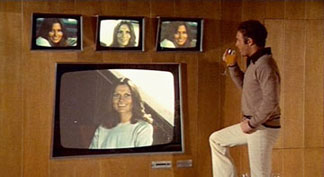 To be honest, I feel strangely blase about the 70s. I missed the decade by a smooth four years and (from all the Wise Ones tell me) didn’t miss terribly much. Yet all evidence would indicate the decade was a junction point for speculative fiction, particularly SF film. Ten little years brought us Star Wars,
To be honest, I feel strangely blase about the 70s. I missed the decade by a smooth four years and (from all the Wise Ones tell me) didn’t miss terribly much. Yet all evidence would indicate the decade was a junction point for speculative fiction, particularly SF film. Ten little years brought us Star Wars, 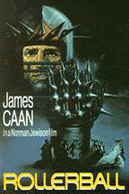 Things pick up eventually…after a hundred and twenty-four minutes of standing, walking, talking, and pill-popping (on screen, thank you). Then it came to me in a flash: Rollerball has a serious structure problem. I don’t care what creative writing course you took, your first act should not be as long as your second and third combined.
Things pick up eventually…after a hundred and twenty-four minutes of standing, walking, talking, and pill-popping (on screen, thank you). Then it came to me in a flash: Rollerball has a serious structure problem. I don’t care what creative writing course you took, your first act should not be as long as your second and third combined.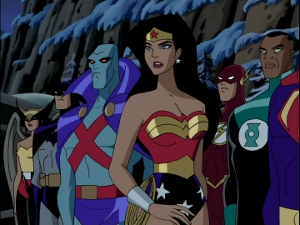 The Justice League of America, in its most rarefied form, represents a powerhouse of D.C. comics heaviest hitters, originally created as a marketing gimmick in 1960 by that great creator of gimmicks and Godhead of the silver age, the comics writer Gardner Fox. But you already knew that, didn’t you?
The Justice League of America, in its most rarefied form, represents a powerhouse of D.C. comics heaviest hitters, originally created as a marketing gimmick in 1960 by that great creator of gimmicks and Godhead of the silver age, the comics writer Gardner Fox. But you already knew that, didn’t you? Plenty of critics dismissed
Plenty of critics dismissed 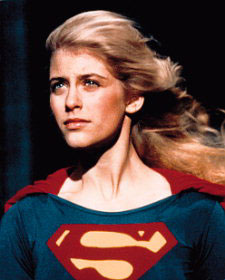 Both comic book and movie begin with Argo City, a civic center blown free from the planet Krypton with its gravity and atmosphere completely intact (take that, laws of physics). I’m gonna go out on a limb and assume that the Action Comics team threw in a few pictures with this story. Not so here. Opening with a “bang” is one of the first things to go out the window, despite this film’s nominal connection with the wider Superman franchise. After all, why show us something we can just talk about it? And have Peter O’Toole stand around, waving his magic wand?
Both comic book and movie begin with Argo City, a civic center blown free from the planet Krypton with its gravity and atmosphere completely intact (take that, laws of physics). I’m gonna go out on a limb and assume that the Action Comics team threw in a few pictures with this story. Not so here. Opening with a “bang” is one of the first things to go out the window, despite this film’s nominal connection with the wider Superman franchise. After all, why show us something we can just talk about it? And have Peter O’Toole stand around, waving his magic wand?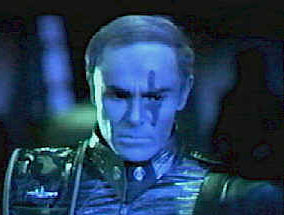 ou have to wonder what goes on in Roger Corman’s smooth, smooth head.
ou have to wonder what goes on in Roger Corman’s smooth, smooth head. Moving on, we find writer/director/producer John Sayles, whom I first encountered through my mother and the 1997 jungle bloodbath, Men with Guns. But let’s not even go there.
Moving on, we find writer/director/producer John Sayles, whom I first encountered through my mother and the 1997 jungle bloodbath, Men with Guns. But let’s not even go there.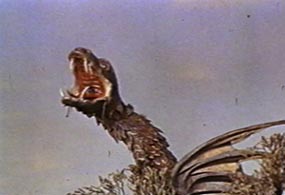 Ah, yes, Sidney Pink. A name synonymous with “quality.” You may not know the name but believe you me, you know his work. This is the man who found the money to give us that great, humanitarian gift, Bwana Devil…in 3-D. And who could forget the rollicking good time (*cough*) that was Sidney’s next picture, Angry Red Planet (which he co-wrote)? Heck, even if you have forgotten (even if all of the above was not to you but stump-jumping jibber-speak), trust me on this one thing: you’ll remember Reptilicus. For about twenty-four hours. This was Pink’s second directorial credit, a worthy follow-up to 1953’s I Was a Burlesque Queen, earned in tandem with former sound designer Poul Bang. Pink also wrote the screenplay together with Angry Red Planet scribe Ib Melchior (who would go on to at least get “story” credit for Death Race: 2000), so this film really, truly can be lain entirely at Mr. Pink’s feet. Few men can say they single handedly ruined a country’s daikaiju genre, but Sidney, were he alive today, would walk away with that brass ring. No contest.
Ah, yes, Sidney Pink. A name synonymous with “quality.” You may not know the name but believe you me, you know his work. This is the man who found the money to give us that great, humanitarian gift, Bwana Devil…in 3-D. And who could forget the rollicking good time (*cough*) that was Sidney’s next picture, Angry Red Planet (which he co-wrote)? Heck, even if you have forgotten (even if all of the above was not to you but stump-jumping jibber-speak), trust me on this one thing: you’ll remember Reptilicus. For about twenty-four hours. This was Pink’s second directorial credit, a worthy follow-up to 1953’s I Was a Burlesque Queen, earned in tandem with former sound designer Poul Bang. Pink also wrote the screenplay together with Angry Red Planet scribe Ib Melchior (who would go on to at least get “story” credit for Death Race: 2000), so this film really, truly can be lain entirely at Mr. Pink’s feet. Few men can say they single handedly ruined a country’s daikaiju genre, but Sidney, were he alive today, would walk away with that brass ring. No contest.